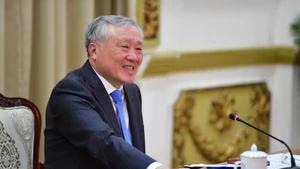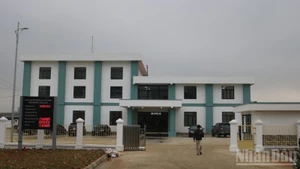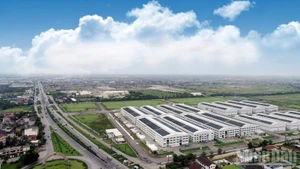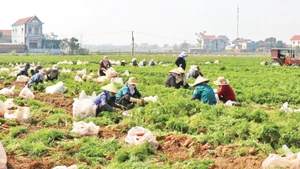GDP growth in the first two quarters of 2023 was lower than the scenario set in Government Resolution No.01/NQ-CP, making six-month GDP growth only 3.72%, much lower than the target of 6.2%.
Stimulating domestic consumption
The economy is facing many challenges both from the outside and internally. In particular, export growth is slowing down with a declining export turnover of key products such as electronic components, textiles, footwear, wood processing, and others because of a sharp decrease in consumer demand in foreign markets.
General Director of the General Statistics Office (GSO) Nguyen Thi Huong said that the target of 6.5% economic growth in entire 2023 is infeasible in the context that market demand has yet to rise and foreign orders have not seen clear changes in addition to unpredictable fluctuations in the world economy.
“The GSO will continue to update the economic growth scenario for the next quarters based on the forecast of the economic picture in the last six months of the year. I believe that with the direction and management of the Government and the Prime Minister as well as the determination of ministries, sectors and localities, the economy can still achieve the highest possible growth amid the difficulties of the global economy,” said Nguyen Thi Huong.
Among the solutions to boost growth, the GSO leader said that it is necessary to focus on stimulating consumption demand and expanding investment to support production. The domestic market is the fulcrum for businesses during fluctuations in the external market.
Mentioning solutions to support socio-economic recovery and development stated in Resolution No. 101 of the 5th session of the 15th National Assembly, Prof., Dr. Hoang Van Cuong, a deputy from Hanoi, said that the 2% VAT reduction applied from July 1 will immediately affect people’s consumption and reduce input costs for production and business activities. This is a very important solution to stimulate domestic demand as the export market is declining.
Besides, the National Assembly’s approval of a loosened visa policy is expected to create a push to the tourism industry in the coming time. In the first six months of the year, the tourism industry experienced a breakthrough with the number of international visitors to Vietnam increasing 9.3 times over the same period last year but only equaling 65% of the level before the COVID-19 pandemic.
Regarding its monetary policy, the State Bank of Vietnam (SBV) has adjusted regulatory interest rates four times, while the central banks of many major economies have not made any moves to loosen their monetary policy. The SBV’s move is aimed at creating favourable conditions for commercial banks to reduce interest rates and increase enterprises’ access to loans.
Thanks to the consensus of the National Assembly and the Government’s efforts, although Vietnam’s economy is still facing difficulties, there have been more positive signals since the second quarter of the year, helping maintain macroeconomic stability, control inflation, and ensure the major balances of the economy.
Room for economic growth by the end of the year
According to economic experts, the room for growth is also being boosted by the disbursement of public investment capital. Currently, many projects under the socio-economic development and recovery programme have basically completed their procedures and can move to the construction phase. In addition, other projects under the medium-term public investment plan for the 2021-2025 period have also been completed in terms of procedures, creating favourable conditions to accelerate disbursement.
Experience shows that high disbursement rate is seen in localities and sectors with the drastic actions of the local leaders. Therefore, the GSO proposed the Government strengthen discipline, step up decentralisation, and uphold the responsibility of the heads of localities and sectors in a bid to accelerate the disbursement rate. At the same time, it is necessary to perfect the legal system governing all activities of public investment projects and investment-related fields such as land, environmental protection, bidding, construction, natural resources and minerals.
Experts have also emphasised the importance of restoring the health of enterprises to foster economic growth. June 2023 witnessed the highest number of enterprises re-entering the market compared to many previous years. In the first six months of the year, an average of nearly 19,000 enterprises were established and resumed operation each month, but there were also 16,600 enterprises withdrawing from the market, showing more positive prospects of production and business but underlining that obstacles remain ahead.
In the current situation, the spirit of companionship and support for enterprises must be widely implemented among the State apparatus, with the view that if we cannot create more favourable conditions for people and businesses, we should not make the situation worse,” said Deputy General Secretary of the Vietnam Confederation of Commerce and Industry (VCCI) Dau Anh Tuan.
The recommendation comes from problems that are accumulating in production and business activities. For example, it is hard for enterprises to enforce regulations on fire prevention and fighting because of overly-strict standards, the deadlock in VAT refund, the difficulty in access to bank credit, and others.
“Enterprises reported to the VCCI that they need to invest 10 billion VND in building a factory, but the expenditure on fire prevention and fighting alone is up to 15-16 billion VND, so it is very burdensome for enterprises to meet such requirement,” Tuan said.
“The VCCI also received a lot of recommendations on speeding up the VAT refund procedures of enterprises in the wood, cassava and agro-forestry processing industries because only one supplier is stuck on the origin issues in the supply chain, the tax handling will be suspended, causing tens of billions of Vietnamese dong to be trapped, stagnating production and business,” Tuan added.
The achievement of the highest possible growth in the remaining months of 2023 depends on many factors such as the world economic and political situation, market competition and the implementation of the programme on socio-economic recovery and development. The National Assembly and the Government have promptly issued many policies and solutions to support people and businesses and the effective implementation of such policies is an important foundation for economic recovery and growth.
















